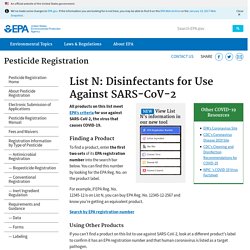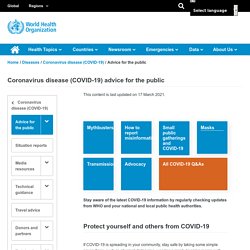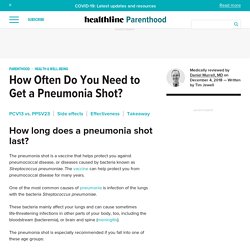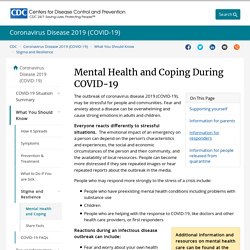

List N: Disinfectants for Use Against SARS-CoV-2. View List N's information in our new tool All products on this list meet EPA’s criteria for use against SARS-CoV-2, the virus that causes COVID-19.

Finding a Product To find a product, enter the first two sets of its EPA registration number into the search bar below. You can find this number by looking for the EPA Reg. No. on the product label. For example, if EPA Reg. Search by EPA registration number Using Other Products If you can’t find a product on this list to use against SARS-CoV-2, look at a different product's label to confirm it has an EPA registration number and that human coronavirus is listed as a target pathogen. Follow the Label When using an EPA-registered disinfectant, follow the label directions for safe, effective use. These products are for use on surfaces, NOT humans. Additional Resources Note: Inclusion on this list does not constitute an endorsement by EPA. List N was last updated on May 7, 2020. EPA Registration Number For example, if EPA Reg. Formulation Type Surface Type. WHO: Advice for the Public. This content is last updated on 17 March 2021.

Stay aware of the latest COVID-19 information by regularly checking updates from WHO and your national and local public health authorities. If COVID-19 is spreading in your community, stay safe by taking some simple precautions, such as physical distancing, wearing a mask, keeping rooms well ventilated, avoiding crowds, cleaning your hands, and coughing into a bent elbow or tissue. Check local advice where you live and work. Do it all! What to do to keep yourself and others safe from COVID-19 Maintain at least a 1-metre distance between yourself and others to reduce your risk of infection when they cough, sneeze or speak. Here are the basics of how to wear a mask: How to make your environment safer Don’t forget the basics of good hygiene Regularly and thoroughly clean your hands with an alcohol-based hand rub or wash them with soap and water.
What to do if you feel unwell Know the full range of symptoms of COVID-19. How Long Does a Pneumonia Shot Last? The immune system reaction that follows a vaccine injection has a chance of causing side effects.

But keep in mind that the substances that make up vaccines are usually the harmless sugar (polysaccharide) surface of the bacteria. There’s no need to worry that a vaccine will cause an infection. Some possible side effects include: low-grade fever between 98.6°F (37°C) and 100.4°F (38°C)irritation, redness, or swelling where you were injected Side effects may also vary based on how old you are when you’re injected. Inability to fall asleepdrowsinessirritable behaviornot taking food or a lack of appetite Rare but severe symptoms in babies can include: high fever of 101°F (38.3°C) or higherseizures that result from a fever (febrile seizures)itchiness from a rash or redness Side effects more common in adults include: feeling sore where you were injectedhardness or swelling where you were injected The most serious possible reaction is anaphylactic shock.
Mental Health and Coping During COVID-19. The outbreak of coronavirus disease 2019 (COVID-19), may be stressful for people and communities.

Fear and anxiety about a disease can be overwhelming and cause strong emotions in adults and children. Everyone reacts differently to stressful situations. The emotional impact of an emergency on a person can depend on the person’s characteristics and experiences, the social and economic circumstances of the person and their community, and the availability of local resources. People can become more distressed if they see repeated images or hear repeated reports about the outbreak in the media. People who may respond more strongly to the stress of a crisis include: People who have preexisting mental health conditions including problems with substance useChildrenPeople who are helping with the response to COVID-19, like doctors and other health care providers, or first responders.
3/9/20: How To Boost Your Emergency Supply Of Prescription Medicines.